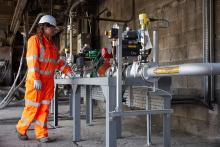
The groundbreaking project, part of Hanson’s commitment to decarbonise its production processes, aims to demonstrate zero-emission asphalt production using nuclear power-derived hydrogen. The new Government funding means an at-scale production trial could run from early 2024.
Hanson is part of a consortium comprising EDF, the National Nuclear Laboratory (NNL), and Vulcan Burners, which will match the Government’s funding. The hub’s pilot project aims to use nuclear power-derived hydrogen from Heysham 2 Power Station in Lancashire to replace the mix of fossil fuels currently used in asphalt production at Criggion.
The hydrogen will be created by diverting small quantities of electricity and steam from the nuclear power generation process at Heysham 2 by constructing a solid oxide electrolysis cell (SOEC) electrolyser. Modern high-capacity tankers will transport the hydrogen as a fuel at Criggion.
Simon Willis, CEO Hanson UK, said: “Nuclear power-derived hydrogen has the potential to be a complete game-changer for decarbonising asphalt and cement production. Our involvement in the Bay Hydrogen Hub project underscores our commitment to lead the way by investing in cutting-edge technologies to prove they can deliver in real-world situations and help us meet our net zero goals.
“Hanson has already successfully shown that hydrogen can be used as part of a net zero fuel mix at our cement works in Ribblesdale, Lancashire, but its use as a fuel at an asphalt site has not yet been physically demonstrated anywhere in the world. It’s an exciting time, and we are hopeful that the project will demonstrate another key step forward towards the decarbonisation of our industry.”
Combined, Government and industry funding for the project will exceed £15mn. Initially, work will focus on developing a final design for the hydrogen production, distribution, and end-use technology. Fuel switching to net zero hydrogen asphalt production at Criggion will follow.
* Government funding forms part of its £1 billion Net Zero Innovation Portfolio (NZIP), which provides funding for low-carbon technologies and systems.










